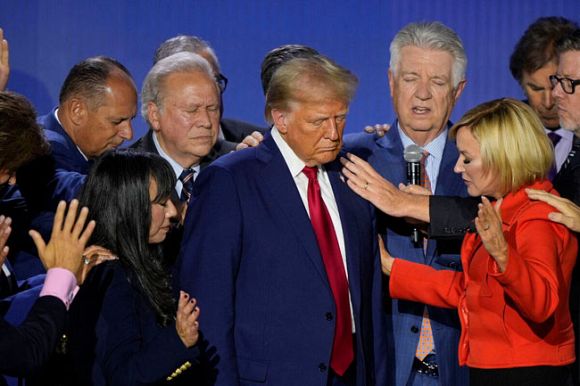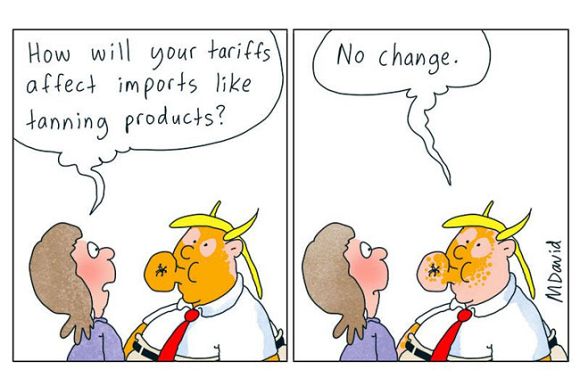Donald Trump's policy to introduce tariffs will have a negative impact on the Australian economy but there are ways to diversify and increase Australia's capacity to deal with Trump's tariffs, writes Craig Hill.
EVEN THOUGH TRUMP SAYS he's going to do a lot of things, in reality he is usually constrained by the checks and balances in the American Constitution.
However, the possibility of a 10% across-the-board tariff by the United States on imports – including those from Australia – would likely have several effects on the Australian economy.
Here’s an analysis of potential impacts:
Reduced exports to the U.S.
Agricultural exports:
Australia's agricultural sector, which exports products like beef, wine, and dairy to the U.S., could face reduced demand due to increased prices in the American market. This may lead to decreased revenue for Australian farmers and exporters.
Minerals and raw materials:
Australia exports resources like iron ore and liquefied natural gas (LNG) to the U.S.. A tariff would make these resources more expensive — potentially reducing their competitiveness against other global suppliers and lowering export volumes.
Manufactured goods:
Australian manufactured exports – including specialised machinery and equipment – would also suffer reduced competitiveness in the U.S. market.
Negative impact on GDP growth
Reduced exports to the U.S. would likely slow Australia's GDP growth as exports contribute significantly to the economy. Lower export revenue means less income for businesses and reduced economic activity across supply chains, affecting related industries and potentially leading to job losses in export-reliant sectors.
Currency depreciation
The Australian dollar (AUD) might depreciate in response to reduced export demand. This could partially offset the impact on Australian exporters by making their goods cheaper in global markets, though it might increase the cost of imports and create inflationary pressures domestically.
Higher import prices
Australia imports a significant amount of goods from the U.S., particularly in sectors like pharmaceuticals, machinery, and technology. A 10% tariff on Australian exports could prompt retaliatory tariffs by Australia on American goods — increasing prices for Australian consumers and businesses and potentially leading to inflationary effects.
Shifts in trade relationships
Australia may seek to reduce dependence on U.S. markets and expand trade relations with other partners, like China, the EU, and Southeast Asia, to make up for the lost demand. Trade diversification efforts may lead to new economic opportunities — though these shifts would take time to develop and fully compensate for losses in the U.S. market.
Impact on key sectors and employment
Industries like agriculture, mining, and manufacturing that are directly involved in exporting to the U.S. may face declines — potentially leading to layoffs and regional economic challenges in export-heavy areas. This may necessitate government intervention or support to offset economic disruptions.
Potential for trade tensions and policy shifts
An increase in U.S.-Australia trade tensions could prompt Australia to re-evaluate its trade and foreign policy. Australia may advocate more strongly for free trade agreements with other partners or engage in regional trade blocs to counterbalance the loss of access to U.S. markets.
In summary, a 10% U.S. tariff would likely have a cooling effect on Australia's economy, reducing exports, impacting key sectors, and potentially prompting a realignment of trade strategies.
However, the extent of the impact would depend on Australia's ability to diversify its trade relationships and mitigate export losses through other markets.
Just as we dealt with China's trade war during the LNP government – and as we dealt with Trump during his last attempt at being president – Australia has the capacity to deal with Trump's threats.
Craig Hill is a Brisbane-based journalist, teacher and business consultant, and a keen observer of Australian and Chinese politics. You can follow Craig on Twitter/X @CraigHill01.
 This work is licensed under a Creative Commons Attribution-NonCommercial-NoDerivs 3.0 Australia License
This work is licensed under a Creative Commons Attribution-NonCommercial-NoDerivs 3.0 Australia License
Support independent journalism Subscribe to IA.

Related Articles
- U.S. Election not about economic anxiety, it’s about religious identity anxiety
- Trump taps into new media and rise in youth conservatism
- Peter Dutton’s Liberals copy Trump’s playbook of falsehoods and fraud
- Stop crying over Trump: Start thinking about unchecked tech barons
- CARTOONS: Dave vs Rupert













